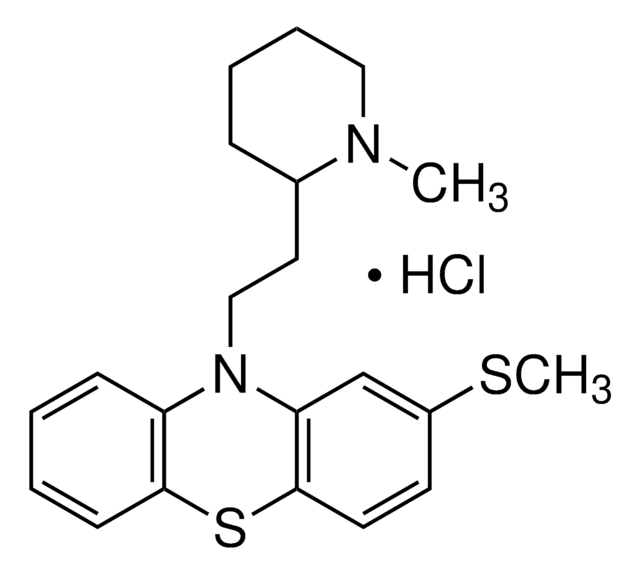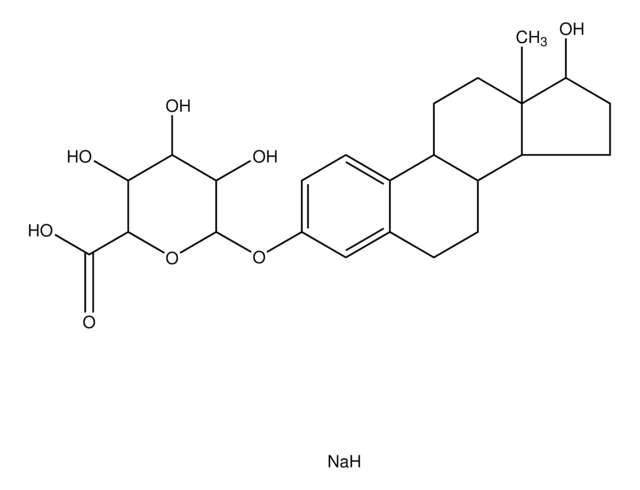T8516
Trifluoperazine dihydrochloride
≥99%, powder
Synonyme(s) :
10-[3-(4-Methylpiperazin-1-yl)propyl]-2-(trifluoromethyl)-10H-phenothiazine dihydrochloride
About This Item
Produits recommandés
Niveau de qualité
Pureté
≥99%
Forme
powder
Couleur
white to off-white
Pf
243 °C (dec.) (lit.)
Solubilité
ethanol: soluble 5 mg/mL
H2O: soluble 50 mg/mL, clear, colorless to yellow
DMSO: soluble
Température de stockage
−20°C
Chaîne SMILES
Cl[H].Cl[H].CN1CCN(CCCN2c3ccccc3Sc4ccc(cc24)C(F)(F)F)CC1
InChI
1S/C21H24F3N3S.2ClH/c1-25-11-13-26(14-12-25)9-4-10-27-17-5-2-3-6-19(17)28-20-8-7-16(15-18(20)27)21(22,23)24;;/h2-3,5-8,15H,4,9-14H2,1H3;2*1H
Clé InChI
BXDAOUXDMHXPDI-UHFFFAOYSA-N
Informations sur le gène
human ... DRD2(1813) , DRD3(1814) , DRD4(1815) , HTR2A(3356) , HTR2C(3358)
Vous recherchez des produits similaires ? Visite Guide de comparaison des produits
Application
- to inhibit clathrin-dependent endocytosis
- as a calmodulin kinase antagonist in cultured Aplysia californica neurons
- as a plasma membrane Ca2+-ATPase (PMCA) inhibitor in mouse duodenal tissues to block the transcellular active calcium flux
Actions biochimiques/physiologiques
Caractéristiques et avantages
Notes préparatoires
Mention d'avertissement
Danger
Mentions de danger
Conseils de prudence
Classification des risques
Acute Tox. 4 Oral - Aquatic Acute 1 - Aquatic Chronic 1 - Eye Irrit. 2 - Muta. 2 - STOT RE 1 - STOT SE 3
Organes cibles
Central nervous system, Eyes
Code de la classe de stockage
6.1C - Combustible acute toxic Cat.3 / toxic compounds or compounds which causing chronic effects
Classe de danger pour l'eau (WGK)
WGK 3
Point d'éclair (°F)
Not applicable
Point d'éclair (°C)
Not applicable
Équipement de protection individuelle
dust mask type N95 (US), Eyeshields, Gloves
Certificats d'analyse (COA)
Recherchez un Certificats d'analyse (COA) en saisissant le numéro de lot du produit. Les numéros de lot figurent sur l'étiquette du produit après les mots "Lot" ou "Batch".
Déjà en possession de ce produit ?
Retrouvez la documentation relative aux produits que vous avez récemment achetés dans la Bibliothèque de documents.
Les clients ont également consulté
Notre équipe de scientifiques dispose d'une expérience dans tous les secteurs de la recherche, notamment en sciences de la vie, science des matériaux, synthèse chimique, chromatographie, analyse et dans de nombreux autres domaines..
Contacter notre Service technique











